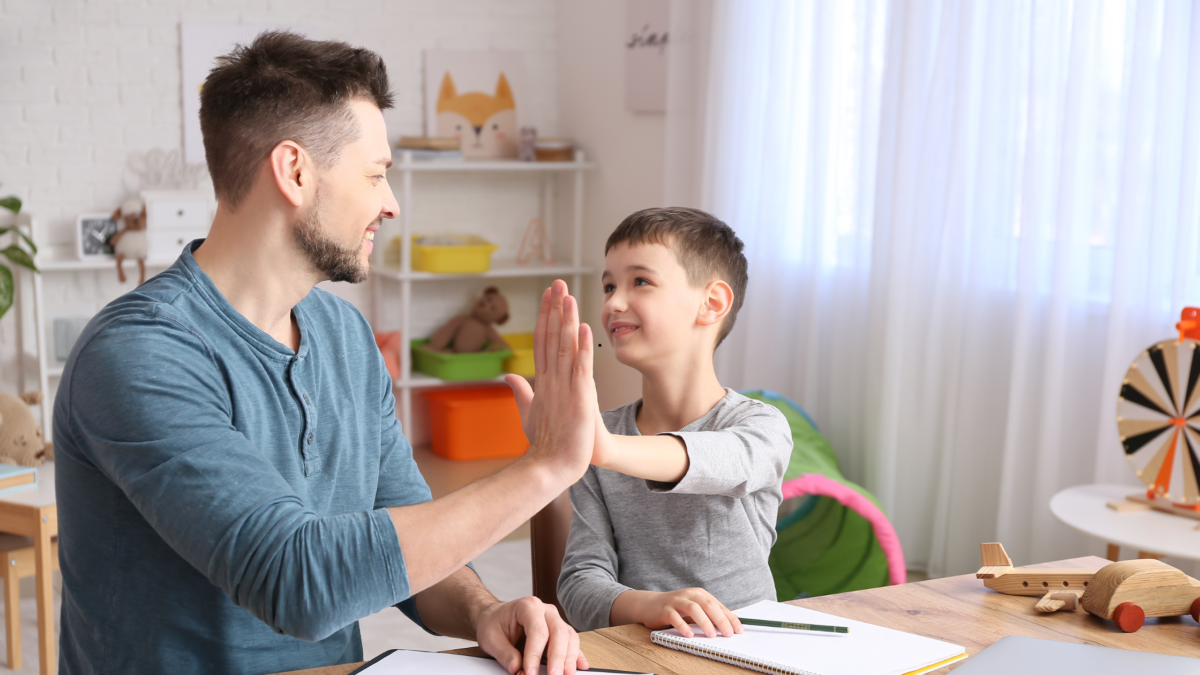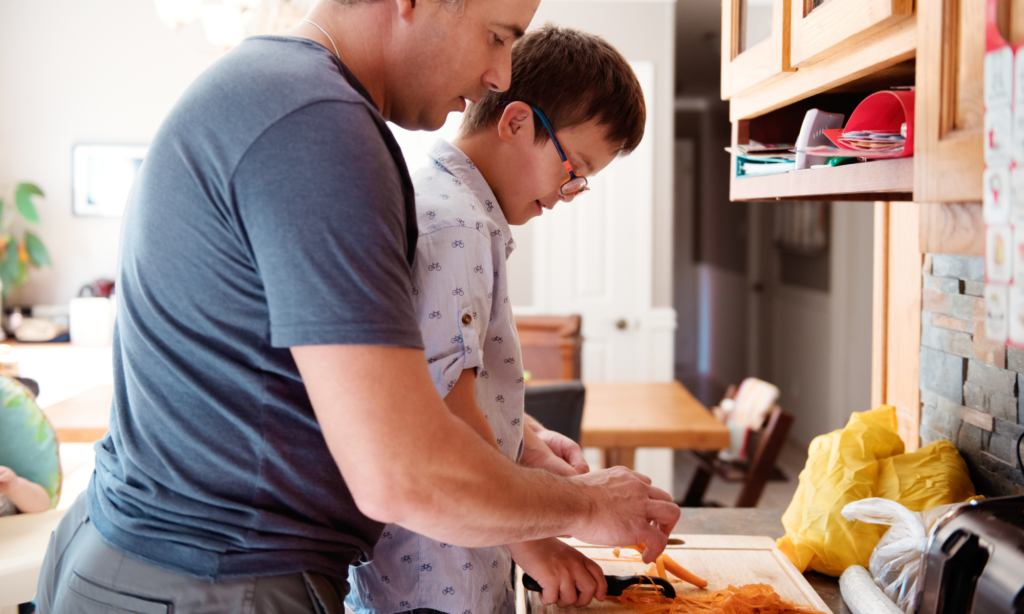
As parents of children with autism, being selfless comes natural for your kid’s needs. The job requires you to be constantly ready for everything that you and your kid needs. With that, it’s so easy to develop that looming feeling about what the future holds and the grief of what should’ve transpired in the past.
It’s no secret that caregiving for children with disabilities can lead to some dynamic differences in a typical parent-child relationship. Due to their needs, parents often neglect their needs to care for their child. In our society, it is considered as a noble act but in hindsight it also poses a bigger risk for the child in the long run.
According to a study, the quality of care provided by parents improves when their needs are met through improved self-care and support from a community. This is where mindfulness can make a meaningful difference. It is a practice that can help you handle moments of overwhelm and manage stress to prevent caregiver burnout.
What Mindfulness Really Stands For
The word mindfulness has been thrown everywhere making it a confusing subject to non-practitioners. Mindfulness is a tool that aims to help you stay in the present. Being mindful is the act of reconnecting yourself with the present and allowing yourself to live one day at a time.
With mindfulness, you get to temporarily stop thinking about everything and enjoy the present. It’s relieving that tension of always being ready and the grieving involved with the loss of independence and exhaustion of parenthood.
With constant practice, it can help you manage the stress that comes with caregiving including handling meltdowns and other overstimulating situations. It aims to help you find a sense of balance and be better equipped to meet your child’s needs with compassion and patience.
Misconceptions about mindfulness

Before you dive into the nitty gritty tips about mindfulness, let’s debunk some common misconceptions that make a lot of people fear or reject the idea of it.
- Contrary to popular belief, mindfulness is more than the typical yoga-style practice. It is a practice of activating the senses to keep you in the present.
- Mindfulness is often misunderstood as needing to be calm all the time or having to sit still for long periods. But at its core, mindfulness is simply the act of being fully present in the here and now. It’s about observing your thoughts, emotions, and experiences without judgment—allowing yourself to feel what you feel without labeling it as “good” or “bad.”
- Mindfulness practice is not always about the practice itself but the concept of giving justice to your current youth, energy, relationships and capabilities. It helps you see the beauty of what the present gives amid all the chaos of parenting.
Instead of feeling trapped by the stress, mindfulness lets you take a deep breath, step back, and observe the situation with a sense of calm and acceptance. This gentle approach to your thoughts and emotions creates a space where you can respond mindfully rather than react and get trapped in parent’s guilt.
How Mindfulness Improves the Level of Care of Autism Caregivers
Mindfulness, when practiced regularly, can improve your mental clarity, emotional resilience, and overall well-being. Such benefits will allow you to approach each caregiving moment with gratitude rather than dread. It can specifically help you in the following areas:
1. Better Emotional Regulation: Mindfulness helps you recognize your emotions without letting them control your actions during high-stress situations, like handling sensory overloads or communicating when your child is having a difficult day.
2. Reduced Anxiety and Stress: Practicing mindfulness reduces cortisol levels and decreases overall stress. It helps you feel more grounded.
3. Enhanced Empathy and Connection: Mindfulness encourages self-compassion, which naturally extends to others. When you are gentle with yourself, you become more empathetic toward your child. Such development helps build a stronger bond and enhance the care you provide.
Incorporating mindfulness into your daily routine is not about changing your child’s behavior or “fixing” situations. It’s about creating a space of peace within yourself that can help you respond to your child with more patience and understanding.
Mindfulness Techniques for Parents of Children with Autism
The beauty of mindfulness is that it doesn’t have to take hours of your day. Small, intentional practices can make a big difference, especially when they’re woven into the “in-betweens” of your routine.
Here are some mindfulness techniques tailored to the lives of busy parents caring for children with autism.
#1 Define the Concept of Mindfulness Your Way

Mindfulness is flexible, and it’s crucial to define what it means for you. Take a moment to think about what being present feels like in your life.
- Does it mean taking a deep breath and observing your child’s behavior without reacting immediately?
- Does it mean grounding yourself in the sounds, sights, and smells around you to stay centered?
Everyone is different. What world for others might not work for you. Therefore, Find a definition of mindfulness that resonates with you personally—something that feels doable, not daunting. Here are some examples:
- Mindful breathing while waiting: Since you often have moments of waiting—whether it’s waiting for water to boil, their child to put on shoes, or even in the car—you can squeeze in a time to pause or breathe.
- Mindfulness while playing with Your Child: Consider noticing colors, textures, and sounds of the toys or activities. Observe your child’s expressions and movements without judgment or expectations.
- Mindfulness during meal preparation: As you prepare meals, notice the sensations—the sound of chopping, the smell of ingredients, and the textures you feel.
- Mindfulness while doing the bedtime routine: During your child’s bedtime routine, pay attention to your tone and touch as you tuck them in. Notice the warmth of their hug, the softness of the blanket, or the sound of your voice reading a story.
- Mindfulness while cleaning up: While tidying toys or cleaning, focus on the physical sensations—how objects feel in your hands, the sound of items being put away, or the rhythm of your movements. Pair the action with deep, steady breaths.
When you define mindfulness on your terms, it becomes an accessible practice rather than another obligation. Remember, mindfulness is not about perfection; it’s about being aware of the present moment, however it looks or feels.
#2 Add a Mindfulness Routine in the ‘In-Betweens’ of Your Day

Time is often the biggest barrier for parents, but the “in-betweens”—like waiting for your child to finish a task, standing in line, or transitioning between activities—are perfect opportunities to practice mindfulness.
During these moments, try taking a few slow, deep breaths to center yourself. Feel the sensation of your feet on the ground, listen to sounds around you, or simply observe your thoughts without attaching to them. These small breaks can be refreshing, helping you reset your mind and body so that you’re ready for the next part of your day.
#3 Consider a Variety of Mindfulness Practices

Mindfulness isn’t a one-size-fits-all practice, so explore different methods to find what suits you best. Here are some mindfulness techniques that parents of children with autism may find particularly helpful:
- Mindful Breathing: Focus on your breath as it flows in and out, which can quickly bring you into the present moment.
- Body Scan: Gently scan your body from head to toe, noticing areas of tension and releasing them.
- Sensory Awareness: Engage your senses to ground yourself. Notice sounds, textures, or sights around you, which can anchor you when you feel stressed.
- Journaling: Writing down your thoughts and emotions can be a powerful way to release stress and observe patterns in your feelings.
Experiment with these techniques and be open to adjusting them to fit your needs. Finding a few practices you enjoy and can rely on will make mindfulness a natural part of your day.
#4 Have a Mindfulness Accountability Partner

An accountability partner, someone you check in with to stay on track, can make a huge difference in maintaining your mindfulness routine. This might be a friend, another parent, or even a family member who understands the challenges of caring for a child with autism. You can schedule regular check-ins, share your mindfulness practices, and encourage each other to stay committed.
Having someone to talk to about your experiences can be uplifting and motivating, especially with the isolating feeling related to caregiving. Your partner doesn’t need to practice mindfulness the same way you do; they’re simply there to support your journey and remind you that you’re not alone in this.
What Types of Comforting Measures Might Parents of a Child with Autism Avoid?
Mindfulness can be a great support, but sometimes parents avoid certain comforting measures out of guilt or the belief that they “shouldn’t” need them. Here are some examples:
- Taking Time Away: Many parents feel guilty about leaving their child with someone else, even briefly. But, it would do more harm if your emotional health gets worse which makes taking breaks as essential.
- Saying “No” to Extra Commitments: Parents often take on additional responsibilities, fearing judgment and letting other people down if they don’t. However, setting boundaries and saying no to unnecessary tasks can help prevent caregiver burnout.
- Seeking Support or Therapy: Sometimes, parents may resist asking for help, feeling that they “should” be able to handle things on their own. But seeking support is a strength, not a weakness.
You are human before you became a parent. Therefore, you have needs and unless those needs are met your body and mind will long for it, leading to potential illnesses in the long run. As parents of children with autism, you cannot afford to get sick which puts more value on taking care of yourself for your kid.
Remember, every parent has limits, and it’s okay to lean on others or take time for yourself.
Get the Much Needed Break with Essential Wellness
No one can truly guarantee the full recovery or prevention of caregiver burnout but you. As hard as it is to have a grip on self-care while caregiving, it’s the only thing that will help sustain the love you allot for your child.
Essential Wellness is a home health care agency in South Florida that provides convenient healthcare support for families with children facing chronic conditions, aging parents, patients in recovery from injury, and those with mental health conditions. Our services include:
- Personal Support (Daily living support)
- Life Skills (Companionship)
- Respite Care / Skilled Respite
- Analysis and Behavior Assistant Services (ABA)
- Nursing and Private Duty Nurse Services
- Speech, Occupational, and Physical Therapy
- Homemaker & Companion Services
- Specialized Mental Health Support
Check out your options with a free consultation to find the right solution for your family. Caregiver burnout is challenging and doesn’t end well if left unaddressed. You matter as much as your child, and support is here when you need it.

